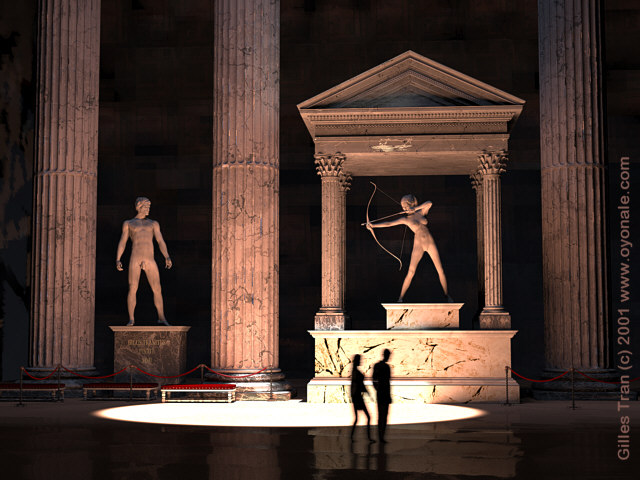




When he was a hero, Eudemyon had been known for his god-like ability to strike his enemies with gleeful abandon. He would crack their skulls, hack off their limbs or slice them up with the merriment of a good smith giving the last polish on a new pair of greaves. Unlike some of his brothers in arms, he didn't enjoy inflicting pain, but he did appreciate a job well done, and pain was a part of it as was sharpening his xyphos on battle's eve. Of course, he warmly participated in the tidying up, when they would raid the enemy's camp, smash infants? heads against the walls, rape and kill the women, eviscerate the animals and turn everything and everyone into a pile of ashes. Then someone would write a lovely song about it, and the echoes of it would reach Eudemyon's hometown.
Within a few years, so many epics had been written about Eudemyon's bravery that no one in his city doubted his heroic status. When he finally died of dysentery, at the age of twenty-seven, the songs told about his final stand against a company of giant wolves. Eudemyon was elevated posthumously to a rank just above a mere mortal, not exactly a god, but good enough. A few statues of him were sculpted in fine, if not top-quality, marble and he soon became one of these reliable divinities that people feel comfortable with because of their not too-impressive, but human-size, record.
After his short apotheosis, the lesser god Eudemyon learnt a few interesting things, but turning tricks on humans using a remote control was less exciting than goring them face to face. He missed his old job. However, he settled into his new, slightly disappointing, divine existence. He mostly spent his time drinking with the other gods and slowly forgot about his former life.
Then, one day, he felt a weakness in his knees. He turned to Asclepios for help, who told him to have a look at the mess down there. Indeed, his city had disappeared, ransacked by jealous neighbours. Those of his people who were not massacred on the spot were taken as slaves and sent to places they had never heard of, where they were not inclined to carry on the cult of a careless god. Without his daily dose of prayers and sacrifices, Eudemyon was simply fading away, starting with the knees.
When the last man who remembered his name died, he disappeared completely. The few remaining statues of him were sold to art collectors for their artistic value, changing hands throughout the centuries.
In 1994, the curator of the Casa Peluzzi did a test search in the brand-new database of ancient texts generously paid for by its IT sponsor. The search retrieved only two references about Eudemyon. However the curator was proud to tell the media-hungry sponsor that the statue down the hall, a Peluzzi property since the times of Savonarole, was actually one of a minor hero of ancient Greece, possibly a third-rank god, whose full name was Eudemyon.
So Eudemyon was back again. Most of his divine friends were still here, though they looked bored and uninterested by his reappearance in their midst. Perhaps they were just jealous. But with all the guests milling in the Casa Peluzzi and calling his name, Eudemyon felt young again. While he scrutinised the cheering crowd, his gaze crossed the marble glare of strange-looking statue on his left, of a young sneering woman. She seemed to hold a grudge against him. Was that her name the people were saying, along with his? She looked familiar, but several millenniums had passed. Where did he have seen her? What did he